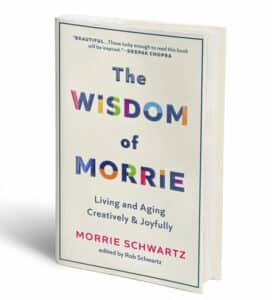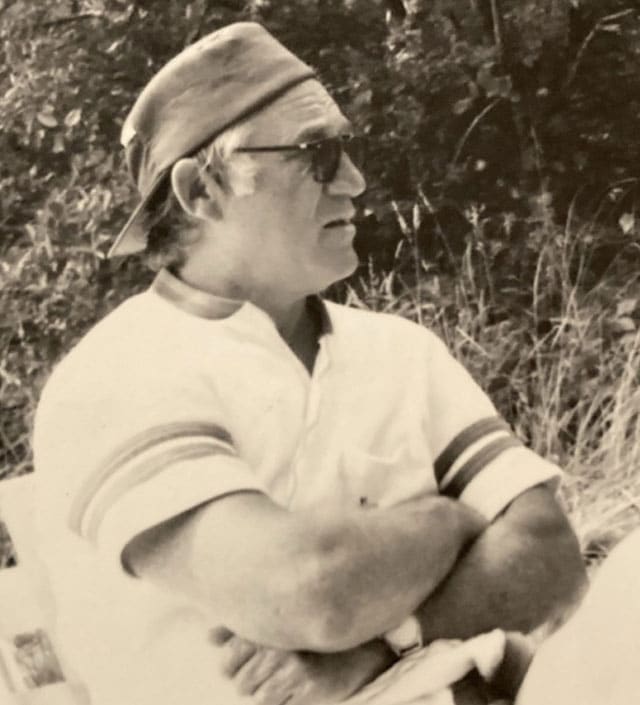“Make new friends” should be at the top of retirees’ to-do list, according to Morrie.
Yes, that Morrie.
Morrie Schwartz wrote hundreds of pages on his philosophy on aging before author Mitch Albom made Morrie famous in his book and the movie “Tuesdays with Morrie,” played by Jack Lemmon.
The Brandeis sociology professor penned his manuscript — newly published as “The Wisdom of Morrie: Living and Aging Creatively and Joyfully” — before he was diagnosed with ALS and started spending Tuesdays with Albom, his former student. Morrie died in 1995.
After his diagnosis, Morrie stuck his manuscript in a drawer. There it stayed, until his youngest son, Robert Schwartz, rediscovered it and edited Morrie’s draft with his mother for Blackstone Publishing.
“My father never thought of himself as an elderly person until he realized society saw him this way” when he was 70. “Then he wrote a book on it.” — Rob Schwartz
“My father never thought of himself as an elderly person until he realized society saw him this way” when he was 70, Schwartz said. “Then he wrote a book on it.”
 Schwartz, a writer and editor, whipped Morrie’s stories, insights and advice into a motivational guidebook in Morrie’s reassuring voice in “Wisdom.”
Schwartz, a writer and editor, whipped Morrie’s stories, insights and advice into a motivational guidebook in Morrie’s reassuring voice in “Wisdom.”
Schwartz spoke about the book during a recent virtual meeting of The Longevity Book Club of the Stanford Center on Longevity. Moderating the book-club meeting over Zoom were Ken Stern, chair of the Longevity Project (which he co-founded with the Stanford Center on Longevity) and Martha Deevy, associate research director and senior research scholar for the Center.
Morrie’s roadmap
“The Wisdom of Morrie” is one part philosophy of aging, while another part tips on aging joyously, Schwartz said.
As a social psychologist, “my father is talking about the damaging idea that elderly people don’t have anything left to live for,” Schwartz said. “People internalize this poisonous idea that they aren’t good for anything.”
Morrie created a term: age-casting. Like type-casting in the acting profession, people over 65 are pushed into certain roles and kept there, he wrote.
“It’s like: You’re an old person, so now you’re supposed to just go to the coffee shop and complain all day,” Schwartz said.
“Elderly people tend to shut off society, but it’s a good time to create a new interest and explore it with new relationships that share that interest,” Schwartz said.
“My father was all about relationships with other people. It’s the central tenant of his philosophy,” Schwartz said.
If financial incentives favor career retirement, but you still want to work, get a new job with new colleagues, Morrie writes.
And laugh.
“He was really dispirited about how elderly people forget to laugh,” Schwartz said.
His dad devoted a chapter to dealing with despair and coping with grief.
“Despair is a difficult thing for everyone,” Schwartz said. “My father had an interesting take on it as a continuum between despair and hope.”
Morrie saw despair and hope as opposite ends of a scale of emotional experience and feelings. He talks about how to cope on days that slide down the despair side.
Morrie’s mother died when he was a young boy. His anecdotes include ways in which he was still healing decades later.
Morrie writes a lot about meditation, too, Schwartz said. He had a meditation coach who came to the house weekly.
But the core of his philosophy of aging is to stay human, Schwartz said.
“That means trying to remember that each person has their own individual world and their own point of view,” Schwartz said. “Compassion is understanding we all have a shared human experience that’s actually all the same.”
At the end of your life, the size of your bank account is not going to matter, he said. It’s the connection to friends and family.
Morrie, the man
“I didn’t realize that he thought that much about aging before this book,” Schwartz said, even though his dad had talked to him about the manuscript daily when he had returned home from Asia while Morrie was writing it from 1988-1992.
Schwartz hadn’t read the manuscript until he rediscovered it in his father’s desk drawer.
“Wisdom” sharpened Schwartz’s understanding of Morrie’s philosophy of life, he said.
“I could hear my father’s voice ringing throughout the manuscript,” Schwartz said.
Morrie tells a lot of stories, shares his poetry and “a lot of creative things,” Schwartz said. “It’s not just a book that’s a narrative to read front to back.”
Some of it, like a whole section on laughter, surprised Schwartz when he sat down to read all of what Morrie had written.
Morrie never thought of himself as aging, he said. And his childlike quality made him seem ageless, Schwartz recalls.
It was important to Schwartz to maintain his dad’s voice in editing the manuscript. “He had such a distinct voice, and if I screwed that up, it would have been a disaster,” Schwartz said.
“There were a lot of things that were very touching,” he said. “He puts a lot of his own fears and worries in there.”
In addition, “There’s more than one mention of me, which I was surprised about, since it’s a book about aging,” he said. Morrie tells a story about a trip to see Schwartz in Japan, for example, that opened his mind to new experiences.
“The Wisdom of Morrie” drills down on perceptions of aging in different cultures.
“Both Japan and China have a more reverent attitude toward aging in society,” said Schwartz. “A major tenet in Confucianism is respecting your parents.”
Schwartz said he gets a lot of questions from audiences in Japan and China, where “Tuesdays with Morrie” is very popular.
It’s sad that Morrie never got to read “Tuesdays with Morrie” or see the movie. He would have “adored” his celebrity, Schwartz said.
“It was part of his personality that he enjoyed the spotlight,” Schwartz said, from center stage in his classroom to the life of a dance party. “He seems like a cute, shy man, but he was a performer,” Schwartz said. “And he believed deeply in these ideas.
“His art was how he lived his life and related to people,” Schwartz said.
He had friends from all types of backgrounds and experiences. “He was able to connect with people at whatever range you want to put out there,” he said.
The Morrie that Albom described and Lemon portrayed on film was always sage and reflective. Of course, Morrie could get angry, had fears and wasn’t always even keel, Schwartz said.
“He was a real person. He had moods,” Schwartz said. “Nobody is a saint.”
Schwartz laments that Morrie’s childlike quality doesn’t really come through in “Tuesdays with Morrie.” Morrie found joy and wonder in discovering new things every day, he said.
“His message was, ‘Don’t judge yourself too harshly,’” Schwartz said.
“Dad saw how self-judgment really drove people down,” he said. “Remove that stumbling block to being happy.”
Linda Hildebrand is a longtime newspaper editor and consumer reporter.
Schwartz is helping produce Onetopia, a festival to benefit mental health, scheduled in May 2024. He has produced feature films including Putty Hill (2010) and Bernard and Huey (2017). He is a partner in a virtual concert-creation platform Moshpit.







